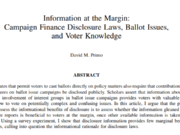Professor Bradley Smith of Capital University, former chair of the Federal Elections Commission, given a bit of extra time for representing the “other side,” was put on the spot right off the bat to defend the CU claim that independent expenditures do not pose a threat of corruption, and noted that the way to understand this claim is not that there can never be corruption from independent expenditures, but that such concerns are not sufficient to overcome First Amendment protection for political speech. Turning to his planned opening remarks, Professor Smith noted that the anti-CU position would have allowed the suppression of Michael Moore’s “Fahrenheit 911” which, after all, was funded and created by a corporation. To Professor Smith the truly radical aspect of CU is the idea, endorsed by four justices, that the participation of a corporation in the production or distribution of a movie or other form of communication is enough to allow the federal government to prohibit or limit it, whether that corporation is CU, Barnes & Noble, or Dreamworks. Professor Smith quoted Justice William Douglas who, joined by Chief Justice Warren, inveighed against the idea that political speech could be limited by the government. Finally, Professor Smith noted that first prosecution of political speech for violating federal campaign laws was the Nixon Administration’s attempt to prosecute a group that purchased a full-page newspaper ad for urging Nixon’s impeachment for invading Cambodia.
Wertheimer also suggested that some, such as Senator Mitch McConnell, are beginning to challenge disclosure requirements. In response, Professor Smith argued that the real debate is not about rolling back current disclosure requirements but whether such requirements should be extended to include, for instance, the requirement that political organizations disclose contributors or members. Wertheimer responded that the contours of the disclosure debate are different today because 501(c)(4) organizations are not subject to disclosure requirements and, post-CU, are now allowed to fund campaign ads, a point echoed by Professor Johnstone – though Professor Smith noted that prior to CU, (c)(4) organizations could fund ads that attacked candidates without directly urging their election or defeat. Professor Teachout added that the focus on disclosure is important because if people don’t know what’s occurring with elections, they cannot identify corruption and seek to control it. Monica Youn noted that while we know that individuals such as Sheldon Adelson have written large checks to SuperPACs, there have been substantial anonymous donations, such as two $10 million contributions to American Crossroads from undisclosed individuals.
Tomasky asked Professor Smith to explain the libertarian concerns about public financing. Professor Smith noted that public financing does not eliminate concerns about what sorts of independent campaign expenditures can or should be limited. Further, Smith noted that the primary libertarian concern with government regulation of campaigns is that, over time, politicians will tend to adopt those reforms that benefit incumbent politicians. Continuing the discussion of public financing, Youn noted that many state-level public financing programs are alive and well, and that such programs can make a difference as it’s not necessary to outspend one’s opponents as much as it is to have a critical mass of funding to ensure adequate participation.
Violations of the FECA can lead to costly civil penalties for which the person appointed treasurer can be personally liable. And as Justice Kennedy pointed out in Citizens United, the FEC has “adopted 568 pages of regulations, 1,278 pages of explanations and justifications for those regulations, and 1,771 advisory opinions since 1975.” A far cry from “Congress shall make no law.” Campaign-finance attorney Ben Barr, who is representing Free Speech on behalf of the Wyoming Liberty Group, says, “The notion that average Americans must wade through this regulatory maze is absurd and an affront to the First Amendment.”














